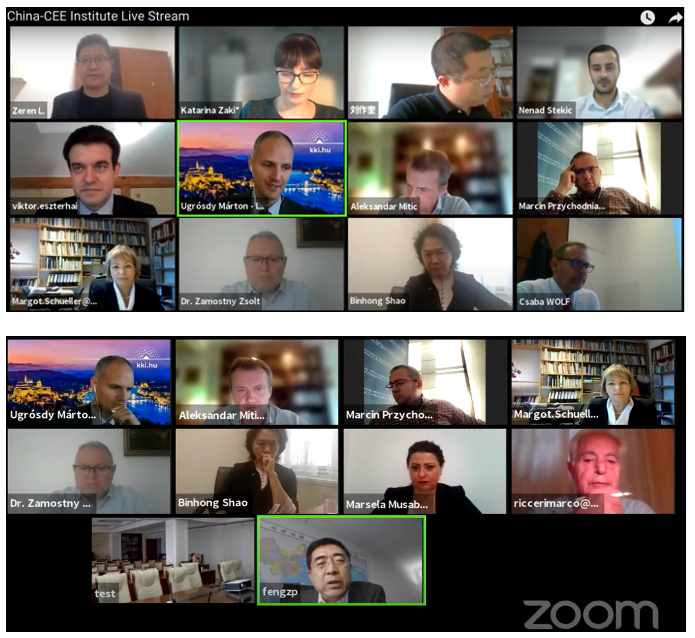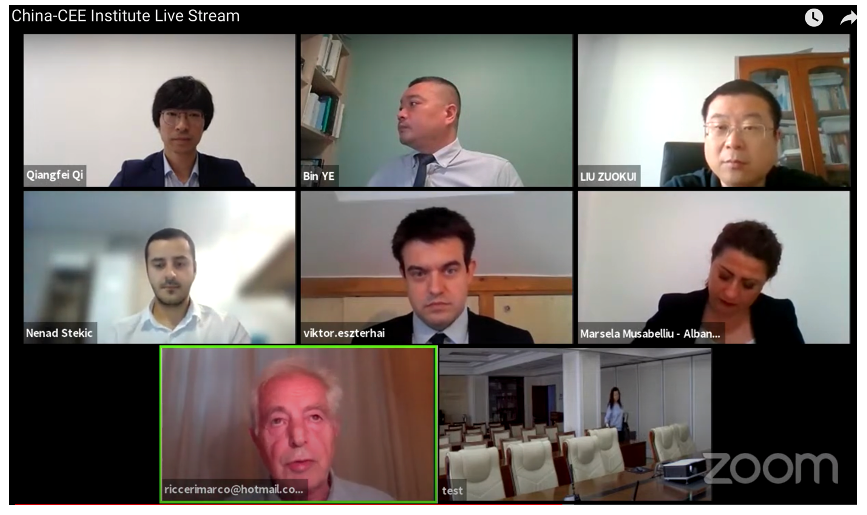On 28 September 2021, the China-CEE Institute and the Institute of Foreign Affairs and Trade of Hungary successfully held joint Zoom seminar on Prospects for EU-China Investment: Chinese and European Perspectives.
The seminar started with welcome speeches from Márton UGRÓSDY, Director of the Institute of Foreign Affairs and Trade of Hungary, and Zhongping FENG, Director of the Institute of European Studies at CASS and President of the China-CEE Institute. Both speakers expressed and emphasized the importance of launching dialogues to discuss challenges in international relations and to promote mutual understanding.

The seminar is composed of two panels. Péter GORECZKY, Senior Analyst at the Institute for Foreign Affairs and Trade (IFAT), moderated the first panel. Fan CUI, Professor from School of International Trade and Economics at UIBE, gave his presentation on the topic “Toward a world trade and investment system based on competitive neutrality and ownership neutrality: A comment on China-EU CAI”. His presentation covers several important aspects of the CAI, including new commitments on market access, state-owned enterprises, labor standards and environment, the CPTPP, competitive neutrality and ownership neutrality, and a world trade and investment system with competitive neutrality and ownership neutrality.
Marcin PRZYCHODNIAK, from Polish Institute of International Affair (PISM), delivered his presentation on the subject of “The end of CAI: Political challenges in China-EU relations”. While acknowledging the potential significance of the CAI, he mentioned the political challenges and difficulties that the EU and China are facing before further advancing the CAI negotiations. Resolving these problems is a prerequisite.
Bin SHENG, Professor from School of Economics at Nankai University, gave his presentation on the subject of “China’s Bilateral Investment Treaties (BITs) and FDI Policy Reforms”. He discussed about the first and second generations of BITs and their differences, China’s New Foreign Investment Law, and potential reforms in the areas of investment liberalization, licensing requirements, national security review mechanism and technology transfer.
Margot SCHÜLLER, Senior researcher at GIGA Institute of Asian Studies, delivered her presentation on “The Role of the EU-China Comprehensive Agreement on Investment (CAI) for Europe”. According to Dr. SCHÜLLER, as two large trade partners and investors, the EU and China will benefit from removing trade and investment barriers, and the CAI offers new opportunities for both Europe and China. For instance, there is a possibility that the CAI may improve access to the Chinese market for European companies and contribute to a better level playing field.

During the second panel, moderated by Dr. Qiangfei QI, Project manager at China-CEE Institute and Junior research fellow at CASS, Marco RICCERI, from Institute for Political, Social and Economic Studies (EURISPES), talked about “Competition – Cooperation: what balance in the face of the common challenge of a new sustainable order?” He talked about the relationship between competition and cooperation. For instance, building a sustainable order means the need of balancing competition and cooperation, which are the two points of reference to balance competition and cooperation, which is the fairest passage that we all need to keep in mind.
Zuokui LIU, Deputy Director of Institute of European Studies at CASS, discussed about “Bilateral Investment Agreement and Transatlantic China Policy Coordination”. According to LIU, the CAI is not only the result of EU-China bilateral interactions, but also the result of trilateral interactions. Thus, the CAI does not only influence EU-China bilateral relations, but also trilateral relations, and it’s important to interpret the CAI from the trilateral perspective.
Viktor ESZTERHAI, Senior Research Fellow, Institute for Foreign Affairs and Trade (IFAT), gave his presentation on “Economic and Political Aspects of the Comprehensive Investment Agreement from a Hungarian perspective”. He explained why Hungary is unconditionally supporting the implementation of the CAI and discussed the relations between Hungary and the CAI by analyzing the role of Hungary in the German Central Eastern European Manufacturing Core.
Bin YE, Associate Professor of Institute of European Studies at CASS, discussed about “The Comprehensive Agreement on Investment (CAI) and New Trade-related EU Initiatives: Opportunities and Challenges”. The core commitments of the CAI with regard to openness and regulation, market access, level playing field and sustainable development were covered in his discussion. It is believed that the CAI may contribute to reducing the risks of “de-coupling”, integrating China into world market, paving the way to join CPTPP and potentially launching EU-China FTA negotiations.

During the two Q&A Sessions, speakers answered several questions from the participants. The questions include issues relating to investment protection in the CAI, institutional framework, the CAI from Hungarian and regional perspectives, the CAI and the solution to the cooperation, etc. During the seminar, all the speakers shared their ideas, opinions and observations. While it’s undeniable that there are challenges and difficulties that the EU and China have to deal with, it is widely believed that mutual communications and dialogues are of great necessity and importance. Considering the current tensions and uncertainties in international arena, mutual understanding comes to the fore. To conclude, IFAT Senior Researcher Viktor ESZTERHAI and Xin CHEN, Executive President of the China-CEE Institute and Deputy Director of the Institute of European Studies at CASS, gave closing remarks on the seminar.
